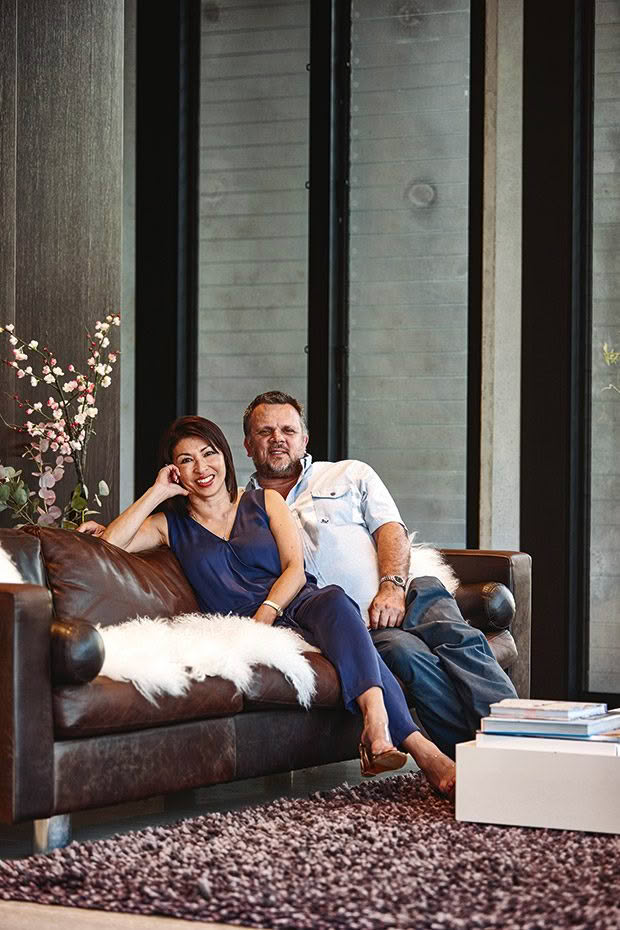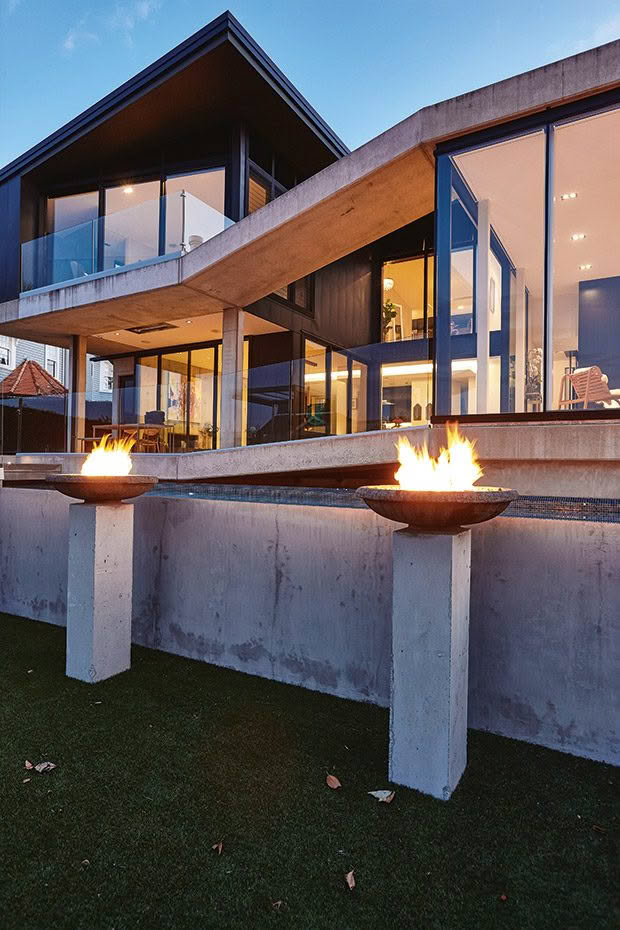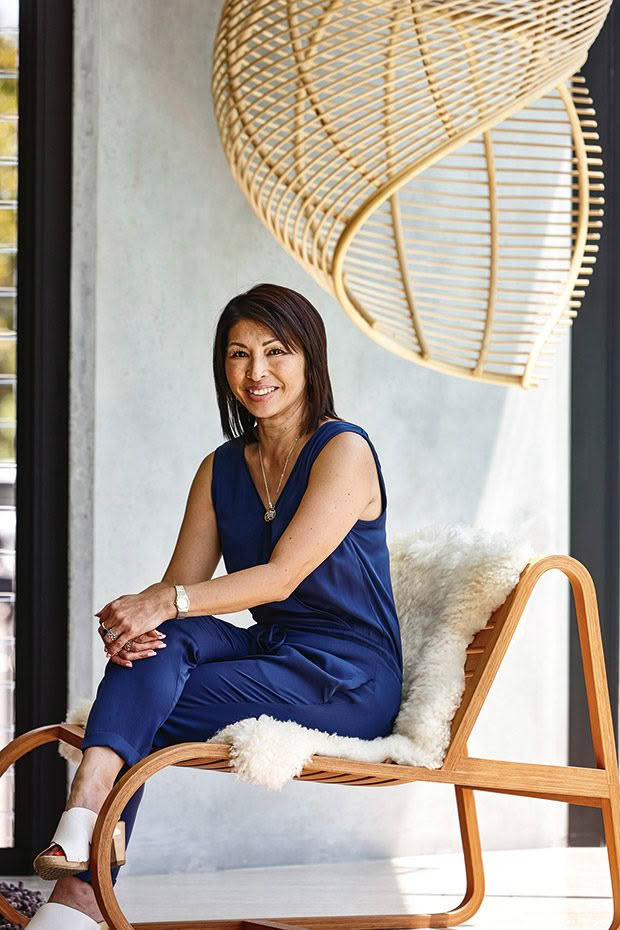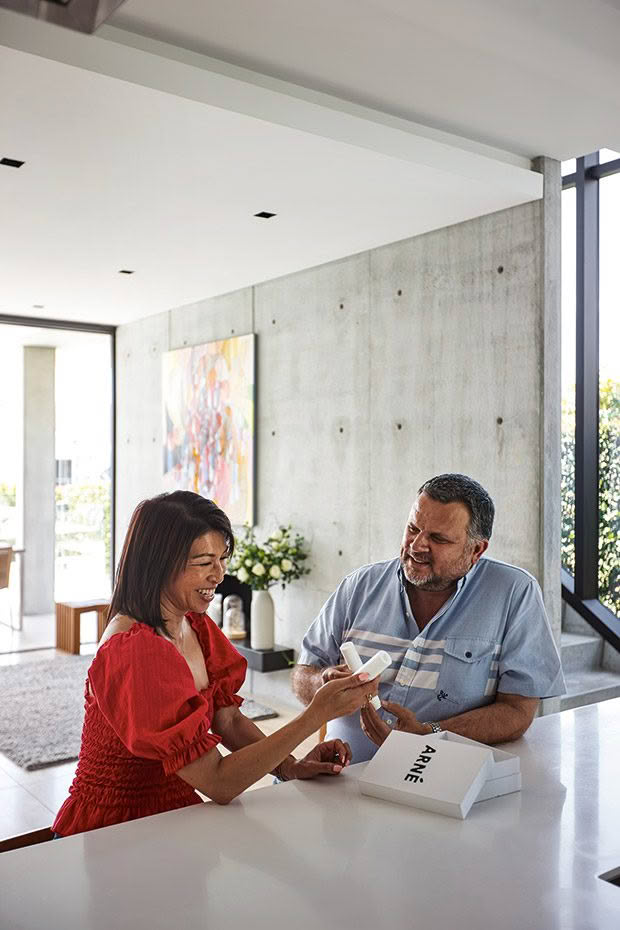Explore this entrepreneurial couple’s ultra-modern home in Herne Bay

Marisa Fong and Simon Laan each run businesses from their home in Herne Bay. “We have an office downstairs which keeps us focused and away from the fridge,” says Marisa.
Career paths with many twists and a dead-end or two led this Auckland couple to success.
Words: Claire McCall Photos: Kevin Emirali
Marisa Fong’s parents were concerned. When they emigrated from Hong Kong to Auckland in the 1960s, Marisa’s mum was 18 and already pregnant. They spoke little English and had no local network, but their aspirations were Kiwi to the core: work hard, buy a house and build a better life for their family.
They started with a tiny Chinese takeaway in New Lynn and ended with a bigger restaurant in a more upmarket suburb – and ultimately a portfolio of property investments. So this working-class couple imagined that their eldest daughter would take the sequacious route they had toiled to create. “Their dream for me was to go to university where I would become a doctor, lawyer or accountant and meet a nice Chinese equivalent,” says Marisa.
Marisa Fong’s parents were concerned. She had dropped out of university, not once but twice, and was working in a cocktail bar in a downtown nightclub (“I still make a mean mojito”) where she had met a man, a DJ or an artist or something of that type. She had spring-boarded from job to job through marketing and merchandising roles but seemed – well – directionless, and now she was talking about traveling to Britain.

In furnishing the house, the couple deliberately avoided the “European apartment-style” and consulted with ex-pat interior designer Brigid Eyley of Hemisphere Design who lured them to Bangkok to visit some high-end showrooms. “It wasn’t long before we’d filled a container to ship back to New Zealand.”
“University didn’t suit me because I wasn’t an academic. I preferred to learn, not from books, but hands-on,” says Marisa. “When I met Simon, I was flatting – another choice that wasn’t in the plan. They didn’t know what to make of him. They couldn’t put him into a box.”
Marisa Fong’s parents were concerned. Their eldest was marrying a man called Simon van der Laan (now just Simon Laan) who had turned his back on law school and was managing a radio station and organizing dance parties. The after-function for their wedding was held at a bar that was packed with strangely dressed people. “To pay for our honeymoon, I organized a dance party at a club next door to the one where we had our post-wedding party,” says Simon.
“I called it Retro, promoted it with flyers and posters, and by the time we arrived after the wedding ceremony at the Winter Garden, there was a line of people down High Street waiting to get in. So we let the overflow come into our venue.”

The Daniel Marshall-designed home has views of the Waitematā Harbour. Wooden chairs and the over-sized hanging shell light in the lounge were bought in Thailand.
Marisa Fong’s parents were concerned. And, for a while, they had good reason. Their daughter and her husband’s paths to business success, a settled home life, and the house they now own on the Herne Bay waterfront was not one they could have imagined. In fact, it was hard to see how two such seemingly disparate types got together at all.
But look closer and find the connections. “We have a similar backstory,” says Simon. “My parents were also emigrants who came out from the Netherlands in the 1960s with virtually nothing. I grew up in a state house, and Dad worked hard as a manager in carpet production most of his life.” Simon’s father ended up buying the company — a high-end bespoke carpet business called Sallée — with two other managers.
- A three-dimensional piece, You Are Sighted by Gina Jones, is a series of circular LED lights between two-way mirrored glass.
- A vase from Republic Home adds a punch of colour to the décor. Although the couple love fresh flowers, they are practical and have no problem with faux versions. Marisa also recreates displays and enjoys the simplicity of the Japanese art of ikebana.
Simon and Marisa both grew up with an understanding that one needs to make his or her own way in the world and, when they met in the late 1980s, they shared this value along with a strong sense of family. They were also rule-breakers. “I was rebellious and independent,” says Marisa. “Mum taught her three daughters to have a strong self-belief.” Simon was a subculture kingpin. He joined Campus Radio and moved from being an on-air DJ to the clubs, then to radio promotions, sales roles and finally station manager, first at bFM and then into the commercial realm at 91FM.
“Independently, I also staged the first breakdancing competitions in the country and managed a group of graffiti artists called the Smooth Crew, securing them legitimate work painting murals for ad agencies, film studios and record companies.”
While Simon was a pioneer of the gig economy (his portfolio of jobs allowed him to save enough for a deposit for their first home, a funny old bungalow in Mount Eden), Marisa was moving through a succession of normal jobs. When she applied for yet another through a personnel agency, the consultant impressed her: “I thought, ‘I like what she does – I’m pretty sure I could do that.’”

Marisa is the family’s principal cook and had mastered “Asian fusion” long before it was even a thing. Initially, the couple bought only three bar stools from Thailand — one for each family member — but when they ordered a fourth, it arrived a centimetre taller. Fortunately, the Simon James chairs for the dining table are all the same height. The pendants above the table are also from Thailand and, above of the fireplace, is a piece by the Auckland-based husband-and-wife team Shintaro and Yoshiki Nakahara. “She draws the lines, and he adds the colours.”
Her role at a tiny recruitment firm in 1990 involved scouring the job vacancies in the newspaper and cold-calling the businesses to offer her services. “On my first day, I got a client: Croxley was looking for an office junior.” Marisa was away laughing.
Here, too, is where their two minds think alike. Both are commercially creative. Over the years, Simon developed, among other things, the Millennium brand of dance events. This was foresighted. “I registered it as a trademark in 1994 and used it every New Year’s Eve until 2000.” Events, held at the Auckland Town Hall, were always a sell-out.

The couple’s daughter Maya is in her second year studying visual arts at AUT. “We’re so proud of her and have a few of her prize-winning artworks on our walls,” says Marisa.
Marisa, meanwhile, worked her way up through the ranks of an international recruitment firm before a harsh reality hit home. “The Australian sales director told me that New Zealand’s revenue comprised the rounding up of a decimal point within that global empire.” She quit: it was time to start her own gig. “I dreamt of a boutique recruitment company that was a good place to work where we didn’t just pay lip service to the values of integrity, where there was no blame game between employees and where there was a culture of dignity and respect.”
With a partner, Wynnis Armour, she co-founded Madison Recruitment. That was 1998. They worked like demons and, from a two-woman band, grew to employ more than 100 staff. “We always had a belief that we were good enough. We nurtured our people but at the same time were very sales-focused. We pitched for big government contracts. We were innovative and customized our IT to make our clients lives easier and better. And it was fun.”

Concrete fins with a “weatherboard” effect provide privacy from the street and are “our version of net curtains”. Although this is an oblique reference to the surrounding historic villas, the house is unashamedly modern with a wide concrete ramp that leads from the footpath to an oversized front door.
In 2013, the couple took Marisa’s parents on a Mediterranean cruise as they hadn’t been to Europe before. They were trying to relax and enjoy themselves in the middle of the vast blue sea. But Marisa Fong’s parents were concerned. How could their daughter leave such a behemoth behind? Were she and her business partner too trusting to have someone else run New Zealand’s largest privately owned recruitment company?
In the background, a secret deal was going down. Across the waves and the airwaves, contracts were signed. The multi-million dollar sale made Madison a publicly listed company and set a precedent for the industry.

The heated 15-metre pool is used extensively by Maya and her friends but is also long enough to be able to swim a decent length.
On their section overlooking Auckland’s harbour, architect Daniel Marshall has designed Marisa, Simon and their 18-year-old daughter, Maya, a “Thunderbird house”. Concrete fins and flyovers and wraparound glass give it a robust and contemporary feel. Inside, there is more industry afoot. Simon’s latest venture involves a business plan to convince Auckland Council to develop an underground music and events venue (while burrowing the tunnels for the City Rail Link).
Marisa, who chaired (among others) a charitable trust helping women through the career pipeline, and is an angel investor, also has something bigger and brighter in her sights. She is set to launch Arné – a skincare brand. Made with the extract of a secret natural ingredient, grown in New Zealand and developed by a Crown Institute, it blocks particulate pollutants from entering the skin, causing the inflammation that accelerates ageing.

The custom-designed fire pits, with flames on demand, are a folly. “They started out as a joke between us and Daniel, our architect, as we tossed around ideas on how to create a true ‘Tracy Island’ Thunderbird house,” says Marisa. The large bowls are actually modified ‘bird baths’ from Artedomus. Concrete ramps connect spaces externally and the upper one links the master bedroom to the flat roof above the lounge. It’s an engineering marvel that holds up the lounge roof, allowing a four-metre-high glass wall with the minimum of steel supports.
“New Zealand has a lovely profile on the world stage, and I want to see if I can make it internationally scalable,” she says. A while back, her mum had an epiphany about the daughter who caused so much doubt. “She finally realized I was a businesswoman.”
Marisa Fong’s parents are no longer concerned.
MARISA’S TIPS ON GROWING A BUSINESS

Find a business partner; being in business is lonely, but the right partner will make sharing the highs and lows a lot more fun and less isolated.
Be clear about the problem you’re solving as a business. As Simon Sinek says, “Start with the why” and have a meaningful purpose. And know that you can “sell” your product or service because no sales means no revenue, which means no business.
Understand what your company’s core values are. Without being clear and consistent on these, the company culture you get may not be what you want. And without a strong culture, growth is difficult as people won’t believe in its purpose.
Understand the impact of cash (or lack of) and make sure you understand your financials or find someone who can help you with this. The saying goes: “Revenue is vanity, profit is sanity, and cash is king.”
Know the metrics that matter for your business and make sure you’re updated regularly so you can spot positive or negative trends as they happen and before they’re fatal.
SIMON’S FIVE WAYS TO SURVIVE THE GIG ECONOMY

Arné is the name of a skincare brand that she is helping to develop and market. The project is progressing slowly and, with recent world events, the team hopes to be ready to launch it late this year.
Don’t sit around waiting for the perfect job with the ideal pay — by the time that arrives, you will be broke and living with your parents again. Better to grab what’s available right now (within reason) to pay for your rent, food, and to save up a war chest of cash.
Don’t be afraid to take on multiple jobs with different employers/clients; 20 hours here, 10 hours there — it all adds up and with each job, you’re meeting new and different people and acquiring new skills.
After a year or three of this, a better understanding will present itself of the work you enjoy and what your skills are worth. Start to hone in on these areas and negotiate a better rate for services. Some of those “new people” you met during the early grind may now be in positions to help, either directly or indirectly.
Be nice to everyone, even if they don’t always deserve it. It’s all about networks and the bigger the network, the more chance to hear about new opportunities before anyone else. Smile and be charming (but not smarmy) and people will be happy to help you go further.
Make sure you understand business/money. The boring stuff — how much money do I need to live, and how long can I live like this on the money I’m making now? That’s why a good war chest is necessary. It’ll tide you over during those in-between times when you don’t have enough high-paying clients. So pay yourself last (none of that “I deserve this, BS”) and always make sure you have enough for the IRD, and your accountant.
Love this story? Subscribe now!
 This article first appeared in NZ Life & Leisure Magazine.
This article first appeared in NZ Life & Leisure Magazine.


